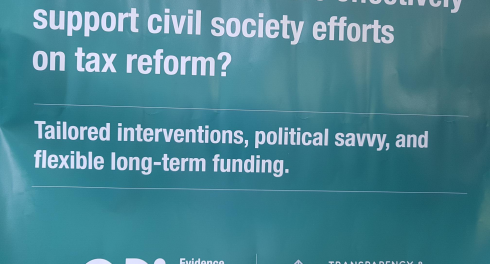| Dear Readers,
2022 is upon us and hopefully you are all refreshed and not quarantining. No shortage of transparency, participation and accountability needs and opportunities in the year ahead. What are your hopes for 2022? We want to hear from you – answer any or all of these three questions, and we will feature responses in the TAI Weekly newsletter during January and on TAI’s social media.
In the meantime, there is no shortage of content from the holiday period for you to dig into.
TAI team.
Highlights
- Captured states, anti-corruption momentum, hiding wealth in cowboy country
- A health check for open gov, a call for humility, and energized civil society
- Opening up big tech, digital subversion, smart communications
- Toward net zero – following the money and mobilizing popular buy-in
- Funding in 2022: local, participatory, accountable aspirations
- TAI spotlight
|
|
Captured states, anti-corruption momentum, hiding wealth in cowboy country
 Photo Credit: BBC
Photo Credit: BBC
Remember the Gupta scandal in South Africa? The long awaited first volume of Judge Raymond Zondo’s report on state capture is out. It documents manipulation through such institutions as South African Airways and the South African Revenue Service and recommends individual for prosecution although there are questions about the capacity of an underfunded National Prosecuting Authority to act.
Want additional context? A new research paper delves into the mechanisms and impacts of state capture with a focus on South Africa and Brazil.
The United States isn’t yet in the category of a captured state, but intriguing to read how Wyoming has became one of the world’s top tax havens, profiting the likes of a Moscow oligarch, Argentinian matriarch, and a Dominican Polo player.
The Biden Administration is keen to tackle such weaknesses, although failure to move forward with the Build Back Better bill that included provisions for a new Corporate Profits Minimum Tax raises questions about the ability to deliver on the OECD global tax deal agreed last year. In hopes it will move, the OECD released Pillar Two Model Rules for domestic implementation of the 15% global minimum.
The U.S. has at least received praise for the anti-corruption commitments announced at the Summit for Democracy. A sign of sustained political will on that front with news that the U.S. will host the 10th Conference of the States Parties (COSP) to the UN Convention against Corruption.
Meantime, a leak of around 3.5 million documents obtained by the Platform for the Protection of Whistleblowers in Africa and Mediapart points to possible embezzlement of $530 million in the DRC in tax advances from the country’s state-owned mining company Gécamines. Resource Matters and other collaborators partially traced the origins and the final destination of the money, including $8 million withdrawn in cash in Kinshasa by one individual – how many suitcases does that require to carry?!

Next Steps for Generation Equality: What Lessons Can OGP Offer? Watch the video of this discussion hosted by Center for Global Development to get some recommendations. |
|
| Essential Listening #1

Engineers Against Poverty begins 2022 with a new podcast series. Over the next few months this will feature expert opinion on infrastructure and development, including accountability for managing ESG risks. Listen to their first episode now. |
|
|
Toward net-zero: following the money and mobilizing popular buy-in
Last year saw a flood of financial commitments to limit climate change, but we will need transparency of funding to assure delivery on these commitments from public and private sectors alike. Intriguing then to read the 2021 edition of Climate Policy Initiative’s Global Landscape of Climate Finance.
Of course, increased financing is not all that is needed. Richard Youngs explores how national conferences in Europe on the political and social elements of a green transition could help countries widen democratic buy-in for the climate agenda.
|
|
 Want some inspiration for the new year? Listen to the Words to Win By podcast. Words To Win By takes listeners on a journey around the globe with renowned communications researcher and campaign advisor Anat Shenker-Osorio as she unpacks real-world narrative shifts that led to real-world victories. Want some inspiration for the new year? Listen to the Words to Win By podcast. Words To Win By takes listeners on a journey around the globe with renowned communications researcher and campaign advisor Anat Shenker-Osorio as she unpacks real-world narrative shifts that led to real-world victories. |
|
|
Funding in 2022: local, participatory, accountable aspirations |
|
MacArthur Foundation´s Co-Directors on Nigeria program Kole A. Shettima and Erin Sines reflected on incorporating gender equity and social inclusion into the anti-corruption strategy.
Ford Foundation and Open Society Foundations Initiative for West Africa launched “New fund to end sexual violence in West Africa”.
Hewlett Foundation supported The Center for Values in International Development´s release of their initial Ethical Development Series of podcasts and videos.
MacArthur Foundation´s president John Palfrey talked to Marc Sims, host of the podcast Just A few Questions, about how it’s possible to reduce violence in Chicago. |
|
 Photo Credit: BBC
Photo Credit: BBC

 Image Credit:
Image Credit: 
 Want some inspiration for the new year? Listen to the
Want some inspiration for the new year? Listen to the  Photo Credit:
Photo Credit: 

